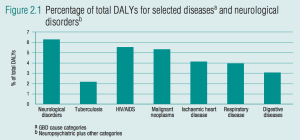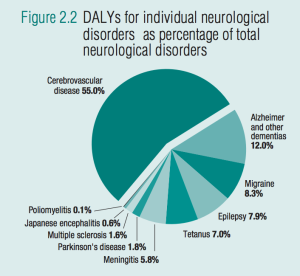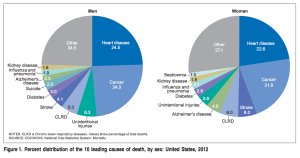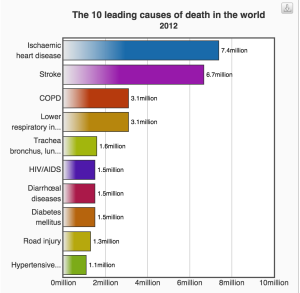Effective health research
I’m still trying to figure out when, where, and how it’s most effective to donate to health research. Here’s a link & data roundup while I start to try to make sense of the research.
I’ll also note that I’m personally  more interested in funding basic research in this area than patient care, family support, etc.  And I’m in the US so I look at data there as part of my research.  And in this domain I’m also aware that I’m biased by personal fears of illnesses that have personally affected my friends and family in negative and very scary ways — particularly cancer and various neurodegenerative diseases.  (Heart disease has also claimed people close to me, but it’s been a lot less scary.)
Leading causes of death
click to enlarge figures:
US top causes of death, 2012 (source: CDC)
Worldwide top causes of death, 2012 (source: WHO) — COPD is chronic obstructive pulmonary disease; emphysema, chronic bronchitis, etc. Â Lung cancers are in the 5th category.
So: heart disease is a big problem everywhere.  Cancer also, but more likely to be fatal in the US.  Strokes also, but less likely to be be fatal in the US.  Respiratory illnesses are also a problem everywhere, but better treated in the US.
This doesn’t include non-fatal disability.  See below for a non-comprehensive look at that (in neurological diseases an disorders).
Cancer
- Slate: Where do the millions of cancer research dollars go every year? (Should be more focus on prevention, less on finding a cure)
- Consumer Reports: Best and worst charities for your donations – Cancer (based on three watchdog sites — overly weighs financials rather than efficacy):
- Best: Cancer Research Institute, New York; The Multiple Myeloma Research Foundation, Norwalk, Conn. (both heavily research)
- Worst: American Breast Cancer Foundation, Baltimore; Cancer Survivors’ Fund, Missouri City, Texas
- Philanthropedia: endorsed cancer charities are a mix of research and other support. Â The Multiple Myeloma Research Foundation is at #7. Â Top 5 (last updated in 2011):
- Susan G. Komen for the Cure (Breast cancer; research & other)
- American Cancer Society (Multiple cancers; research & other)
- LIVESTRONG (for people with cancer now)
- Leukemia & Lymphoma Society (blood cancers; research & other)
- St. Jude’s Children’s Research Hospital (pediatric cancers; research & treatment)
Neurological diseases and disorders
- Data from the WHO about the impact of various neurological disorders in Disability Adjusted Life Years (DALYs):


Note that they’re including stroke victims above, and that those make up the majority of the impact.  Aside from that, Alzheimer’s and other dementias have the biggest health impact worldwide. - McGovern Institute: Brain Disorders: by the numbers (impact information about psychiatric illnesses, Alzheimer’s, Parkinson’s, autism spectrum)
- Philanthropedia’s aging recommendations from 2011 — top endorsement is Alzheimer’s Association (research & other)
To investigate further:
- National Institute of Neurological Disorders and Stroke (site currently down)
—
This is not at all a comprehensive list or topics; just a set of starting points.


